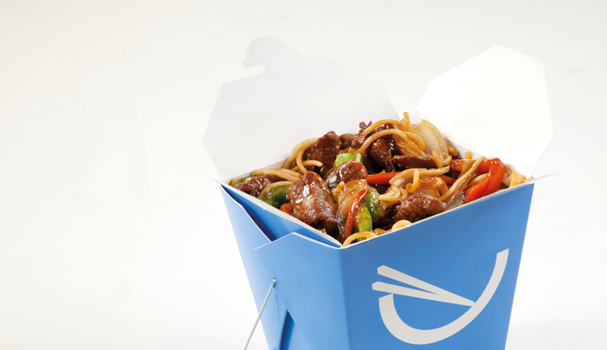There’s no doubting that the USA is responsible for the bulk of fast-food concepts on these shores. Whilst McDonald’s and Subway sit atop the market, they have also given rise to a new generation of franchises looking for a slice of the action. For Des Pheby, managing director of Wok & Go, the noodle franchise, a trip across the pond was enough to convince him to have a shot. As he explains, it was a piece of pop culture that proved the clincher. “You always see the characters in US sitcoms eating out of these American-style noodle boxes – but we didn’t have them in the UK at the time.”
Pheby took his first foray into the world of catering after being made redundant from his previous role: a financial analyst for a logistics firm. “I was looking for something different to do so I moved into catering,” he says. However, running an independent coffee and sandwich shop wasn’t sustainable at a time when the likes of Starbucks and Costa were starting to dominate the market in the UK. Prior to his holiday to the United States, Pheby had come across a small noodle bar in High Wycombe, where he was living at the time. “It was always in the back of my mind,” he admits. The seed for Wok & Go was sown.
Despite the first restaurant being launched in Chester in 2008, Wok & Go is only now starting to attract the attention of the franchise community in the UK and beyond. “We’ve stayed under the radar for a while, almost intentionally really, because we’ve obviously stayed out of London,” Pheby says. “And the fact that it was entirely self-funded also had a part to play. “I have put everything I have into the business,” he adds. “There’s no outside funding, there’s no private equity partner, there’s no bank-funding.”
But as any entrepreneur will attest, your own money can only get you so far when you’ve got your eyes set on rapid growth. After spending two years drumming up trade in its initial outlets, franchising eventually became a necessity for Pheby’s fledgling noodle brand. “He stresses, however, that it’s not the ‘easier option’ that many people make it out to be. “Our business model itself lends itself very well to franchising so it seemed a bit of a no-brainer but the franchising has been challenging,” Pheby admits. “Everyone seems to think it is an easy route to business growth and financial security – but it’s not. It’s probably more complicated in the early stages than opening your own stores because you are managing other people’s expectations.”
Pheby adds that he was unwilling to dive head first into franchising until he was sure he had a concept with legs. “When I opened the first Wok & Go, I didn’t know how well it was going to do,” he explains. “Opening up in Chester, even close friends were saying ‘who’s going to buy noodles at lunchtime?’ They couldn’t quite get their head around the fact that it’s not a full-blown Chinese; it’s noodles in a box. But it actually lends itself very well to lunchtime trade.”

Adam Pescod
EF's editor is tasked with ensuring these hallowed pages are rich with excellent, engaging and error-free stories for fabulous franchisors and franchisees. Pescod previously plied his trade penning pieces about pubs and pints. He is also a sucker for alliteration.

Adam Pescod
EF's editor is tasked with ensuring these hallowed pages are rich with excellent, engaging and error-free stories for fabulous franchisors and franchisees. Pescod previously plied his trade penning pieces about pubs and pints. He is also a sucker for alliteration.
































